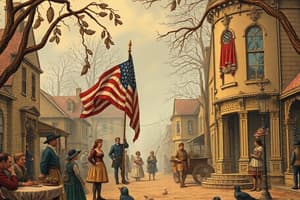Podcast
Questions and Answers
What was the main purpose of the Daughters of Liberty?
What was the main purpose of the Daughters of Liberty?
- To govern Massachusetts
- To promote the Intolerable Acts
- To boycott British goods (correct)
- To support British trade
The Intolerable Acts were intended to punish the Bostonians and restrict their self-governance.
The Intolerable Acts were intended to punish the Bostonians and restrict their self-governance.
True (A)
What was the significance of the First Continental Congress held in Philadelphia in 1774?
What was the significance of the First Continental Congress held in Philadelphia in 1774?
To discuss the repeal of the Intolerable Acts and assert the rights of the colonies.
The British government imposed the _____ Act, which taxed sugar, coffee, and molasses upon entry into the colonies.
The British government imposed the _____ Act, which taxed sugar, coffee, and molasses upon entry into the colonies.
Match the following events or items with their descriptions:
Match the following events or items with their descriptions:
What was the primary purpose of the Sugar Act?
What was the primary purpose of the Sugar Act?
Colonists were in favor of taxation without representation.
Colonists were in favor of taxation without representation.
What did the Stamp Act tax?
What did the Stamp Act tax?
The ________ were formed to take direct action against the Stamp Act and were known for vandalizing homes of stamp collectors.
The ________ were formed to take direct action against the Stamp Act and were known for vandalizing homes of stamp collectors.
Match the following acts to their descriptions:
Match the following acts to their descriptions:
Which British Prime Minister thought that the money raised by the Sugar Act should be used for defense and the development of the colonies?
Which British Prime Minister thought that the money raised by the Sugar Act should be used for defense and the development of the colonies?
Colonists reacted to the Stamp Act with petitions and peaceful protests.
Colonists reacted to the Stamp Act with petitions and peaceful protests.
The British response to colonial smuggling was to ________ on smugglers to enforce taxation.
The British response to colonial smuggling was to ________ on smugglers to enforce taxation.
What was the main purpose of the Stamp Act passed in 1765?
What was the main purpose of the Stamp Act passed in 1765?
Colonists supported the Quartering Act that required them to house British soldiers.
Colonists supported the Quartering Act that required them to house British soldiers.
Name one prominent figure who opposed the Stamp Act and helped inspire protests.
Name one prominent figure who opposed the Stamp Act and helped inspire protests.
Colonists' main grievance against the British government was _____ without representation.
Colonists' main grievance against the British government was _____ without representation.
Match the following acts to their purposes:
Match the following acts to their purposes:
What was the response of colonists to the Quartering Act?
What was the response of colonists to the Quartering Act?
The Navigation Acts benefitted colonial merchants primarily.
The Navigation Acts benefitted colonial merchants primarily.
What did the Proclamation of 1763 require colonists to do?
What did the Proclamation of 1763 require colonists to do?
The phrase 'no taxation without representation' reflects colonists' belief about _____ in Parliament.
The phrase 'no taxation without representation' reflects colonists' belief about _____ in Parliament.
Who were the Sons of Liberty?
Who were the Sons of Liberty?
What act was repealed in March 1766 after significant American boycotts?
What act was repealed in March 1766 after significant American boycotts?
The Declaratory Act stated that the colonies were independent of British Parliament.
The Declaratory Act stated that the colonies were independent of British Parliament.
What event on March 5, 1770, involved British soldiers shooting into a crowd in Boston?
What event on March 5, 1770, involved British soldiers shooting into a crowd in Boston?
The Tea Act of 1773 gave a monopoly on tea sales to the __________ Company.
The Tea Act of 1773 gave a monopoly on tea sales to the __________ Company.
Match the following events with their descriptions:
Match the following events with their descriptions:
Which of the following was an outcome of the Townshend Acts?
Which of the following was an outcome of the Townshend Acts?
The Intolerable Acts aimed to punish the colonists for the Boston Tea Party.
The Intolerable Acts aimed to punish the colonists for the Boston Tea Party.
What was one reason the British Parliament did not want to repeal the Stamp Act initially?
What was one reason the British Parliament did not want to repeal the Stamp Act initially?
Under the Quartering Act, colonists were forced to supply soldiers with __________.
Under the Quartering Act, colonists were forced to supply soldiers with __________.
Match the acts with their effects:
Match the acts with their effects:
What did the colonists do in response to the Tea Act?
What did the colonists do in response to the Tea Act?
The Coercive Acts were also known as the Intolerable Acts.
The Coercive Acts were also known as the Intolerable Acts.
What primary action did the First Continental Congress take in response to British actions?
What primary action did the First Continental Congress take in response to British actions?
Charles Townshend was the British __________ minister who influenced the Townshend Acts.
Charles Townshend was the British __________ minister who influenced the Townshend Acts.
Flashcards
The Sugar Act of 1764
The Sugar Act of 1764
A tax on sugar, coffee, and molasses paid upon entry into the colonies. This was an indirect tax as the tax was included in the price of the goods.
Daughters of Liberty
Daughters of Liberty
Groups of colonial women who boycotted British goods, particularly tea and clothing, in protest against British policies.
Coercive Acts
Coercive Acts
A series of laws passed by the British Parliament to punish Boston for the Boston Tea Party, also known as the Intolerable Acts in the colonies.
First Continental Congress
First Continental Congress
Signup and view all the flashcards
Tar and Feathering
Tar and Feathering
Signup and view all the flashcards
Sugar Act
Sugar Act
Signup and view all the flashcards
Taxation Without Representation
Taxation Without Representation
Signup and view all the flashcards
Stamp Act
Stamp Act
Signup and view all the flashcards
Sons of Liberty
Sons of Liberty
Signup and view all the flashcards
Boycott of British Goods
Boycott of British Goods
Signup and view all the flashcards
Colonial Resolutions
Colonial Resolutions
Signup and view all the flashcards
Stamp Act Riots
Stamp Act Riots
Signup and view all the flashcards
Stamp Act Congress
Stamp Act Congress
Signup and view all the flashcards
Proclamation of 1763
Proclamation of 1763
Signup and view all the flashcards
Colonial Reaction to Proclamation of 1763
Colonial Reaction to Proclamation of 1763
Signup and view all the flashcards
Quartering Act
Quartering Act
Signup and view all the flashcards
Patrick Henry's Resolutions
Patrick Henry's Resolutions
Signup and view all the flashcards
Townshend Acts
Townshend Acts
Signup and view all the flashcards
Writs of Assistance
Writs of Assistance
Signup and view all the flashcards
The Townshend Acts
The Townshend Acts
Signup and view all the flashcards
The Declaratory Act
The Declaratory Act
Signup and view all the flashcards
The Intolerable Acts/Coercive Acts
The Intolerable Acts/Coercive Acts
Signup and view all the flashcards
The Boston Massacre
The Boston Massacre
Signup and view all the flashcards
The Boston Tea Party
The Boston Tea Party
Signup and view all the flashcards
Committees of Correspondence
Committees of Correspondence
Signup and view all the flashcards
The Tea Act
The Tea Act
Signup and view all the flashcards
The Stamp Act
The Stamp Act
Signup and view all the flashcards
Colonial Boycotts
Colonial Boycotts
Signup and view all the flashcards
The Declaratory Act's Impact on Colonists
The Declaratory Act's Impact on Colonists
Signup and view all the flashcards
Consequences of Colonial Boycotts on British Exporters
Consequences of Colonial Boycotts on British Exporters
Signup and view all the flashcards
The First Continental Congress
The First Continental Congress
Signup and view all the flashcards
The Quartering Act
The Quartering Act
Signup and view all the flashcards
Indirect Tax
Indirect Tax
Signup and view all the flashcards
Study Notes
Limits on Freedom
- Militias comprised local men for local protection
- British colonies allowed local voting for legislatures
- King George III and British Parliament viewed colonies as supporting the mother country
- British wanted control over North American colonies
- High cost of the British-Indian War led to debt
Taxation Without Representation
- French and Indian War was costly
- Britain kept 10,000 soldiers in the colonies
- Revenue needed for colonies
- King George III ruled for 59 years
- Sugar Act taxed imported sugar products
- Currency Act controlled colonial currency
- Colonial grievances voiced
- Mercantilism prioritized British wealth
- Navigation Acts regulated colonial trade
- Colonists resented taxation without representation
- Colonists opposed taxation without colonial representation in Parliament
Stamp Act
- Stamp Act of 1765 sparked protests over printed materials taxation
- Designed to raise revenue for British troops
- Provoked widespread protest in the colonies
Colonial Protests Grow
- British attempted to raise revenue through other taxes
- Townshend Acts imposed duties on various goods (tea, glass, paper, lead, paint)
- Colonial salaries and judges were now financed by colonial taxes
- Colonists protested British government's actions
- Colonists strongly influenced by John Locke's philosophy of individual rights
- Sons of Liberty organized protests against British policies
- Organized boycotts of British goods to protest taxes
Preparing to Fight
- Intolerable Acts (Coercive Acts) aimed to punish Boston
- Boston Port Act closed Boston Harbor until damages were paid
- Massachusetts lost self-governance
- Massachusetts Assembly disbanded
- New Quartering Act required colonists to house British troops
The Sugar Act
- Description: Tax on sugar, coffee, and molasses. Taxed items upon entry into colonies
- Indirect tax, built into the price of goods.
- Tax on items containing sugar.
- Meant to recoup losses from the French and Indian War
- British used tax revenue to finance colonies' defense. Colonists disliked this approach
- Revenue needed to run the colonies
- Colonists resisted being taxed without representation
The Stamp Act
- Description: Tax on printed materials (legal documents, playing cards, etc.)
- Forced colonists to pay direct tax for using paper
- Colonists protested in letters to parliament, rioting, and boycotting British imports
- Colonial governments wrote resolutions to British parliament
The Declaratory Act
- Description: British Parliament had the right to pass any laws concerning the colonies.
- British declared colonies were subordinate to British Parliament
The Townshend Acts
- Description: Tax on imported goods (glass, paper, lead, paint, tea)
- Revenue to pay colonial officials
- Colonists protested the tax
- Colonists boycotted British products
- Massachusetts legislature issued a statement of protest that was sent to other colonies
The Boston Massacre
- Description: British soldiers fired on colonists protesting British presence
- Increased tension between colonists and British officials
- Fueled colonial resentment against British policies
The Tea Act
- Description: East India Company given monopoly on tea sales to reduce their debt
- Colonists saw this as a way to take control of the market
- Britain lowered the price of tea more than smugglers
- Boston Tea Party (December 16, 1773) resulted
- Colonists dumped British tea into the harbor to protest the Tea Act
The Intolerable Acts (Coercive Acts)
- Description: Series of punitive laws imposed on Massachusetts as punishment for Boston Tea Party
- Closed Boston Harbor
- Suspended the Massachusetts legislature
- Increased the Quartering Act
- British Parliament declared Massachusetts as in a state of rebellion
Studying That Suits You
Use AI to generate personalized quizzes and flashcards to suit your learning preferences.




